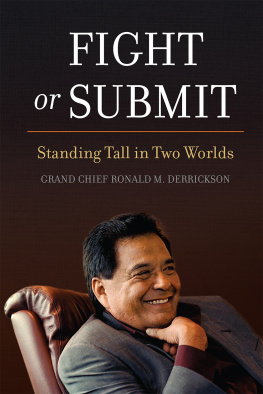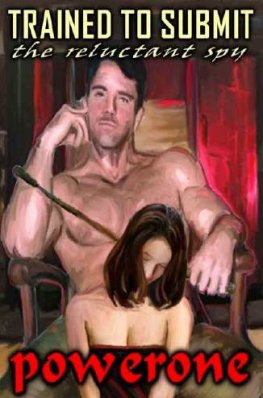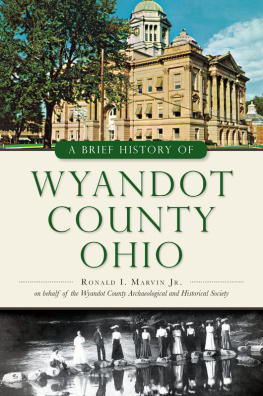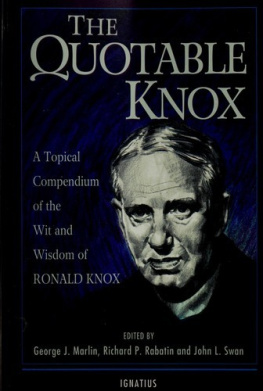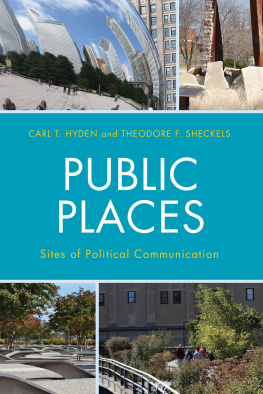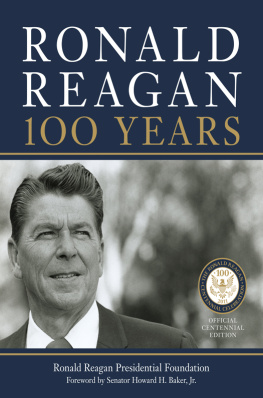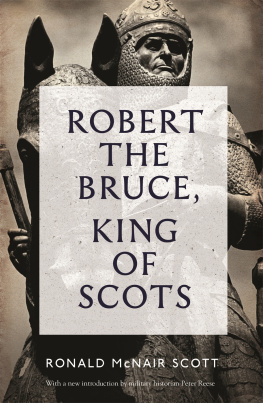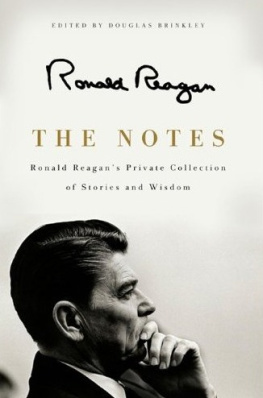Grand Chief Ronald M. Derrickson - Fight or Submit
Here you can read online Grand Chief Ronald M. Derrickson - Fight or Submit full text of the book (entire story) in english for free. Download pdf and epub, get meaning, cover and reviews about this ebook. year: 2020, publisher: ECW Press, genre: Home and family. Description of the work, (preface) as well as reviews are available. Best literature library LitArk.com created for fans of good reading and offers a wide selection of genres:
Romance novel
Science fiction
Adventure
Detective
Science
History
Home and family
Prose
Art
Politics
Computer
Non-fiction
Religion
Business
Children
Humor
Choose a favorite category and find really read worthwhile books. Enjoy immersion in the world of imagination, feel the emotions of the characters or learn something new for yourself, make an fascinating discovery.
- Book:Fight or Submit
- Author:
- Publisher:ECW Press
- Genre:
- Year:2020
- Rating:3 / 5
- Favourites:Add to favourites
- Your mark:
- 60
- 1
- 2
- 3
- 4
- 5
Fight or Submit: summary, description and annotation
We offer to read an annotation, description, summary or preface (depends on what the author of the book "Fight or Submit" wrote himself). If you haven't found the necessary information about the book — write in the comments, we will try to find it.
Fight or Submit — read online for free the complete book (whole text) full work
Below is the text of the book, divided by pages. System saving the place of the last page read, allows you to conveniently read the book "Fight or Submit" online for free, without having to search again every time where you left off. Put a bookmark, and you can go to the page where you finished reading at any time.
Font size:
Interval:
Bookmark:

Fight or Submit
Standing Tall in Two Worlds
Grand Chief Ronald M. Derrickson

Whenever I think about Ron Derrickson, I recall the television interview in which Derril Warren, former B.C. Conservative leader, described him as the most persecuted man in Canada. He then added: But if hed been white, wed have been building statues in his honour. Those extremes aptly encapsulated the Two Worlds. Ron was either vilified as an uppity Indian or lauded as a remarkable businessman and leader. The strain of those conflicting viewpoints produced a man who was invariably controversial, one forever surrounded by fervent critics or solid supporters; no commentator was ever neutral. This book, in my view, commendably explains how that came about.
It was so long ago that I cannot remember the first time that I met Ron Derrickson. But the circumstances remain vivid. It was the late 1970s, and I was working as Advisor to The Alliance of the Musqueam, Sechelt and Squamish Bands, a group directly formed by the respective leaders to pursue economic development issues. Fred Walchli, then Director General of the B.C. Regional Office of Indian Affairs justifiably praised in the book for his support of Native aims had suggested to The Alliance Bands that they might want to consider inviting Westbank to become the fourth member. My rather vague impression of Ron Derrickson before the ensuing meeting was of a hard-nosed, slightly shady leader who steamrolled any opposition. Not even close! When you meet Ron, you meet a charmer, always smiling and full of humorous remarks and jokes. Yes, and a respectful listener, one who generally made a solid impression on The Alliance leaders. So Westbank joined The Alliance and, through Ron, became a forceful support for their issues. Working in that forum, Ron and I gravitated towards one another. When I was called to the Bar in 1979, both Musqueam and Sechelt retained me as Band lawyer and, not long afterwards, so did Westbank.
Working with Ron Derrickson during the seven years he remained Chief was a gift in my life. I admired his strong commitment to working hard I shared that with him. I witnessed firsthand his dedication to his people, his love of his people, that was not readily discernible by the majority society, but that was at the root of everything he did. I used to so like going to Westbank, staying at Rons house overnight, and then returning to Vancouver laden with files that had to be urgently dealt with. Throughout, he was a steadfast and generous friend, and wed enjoy socializing together and having a lot of fun. However, having said all that, I must emphasize the experience that delighted me the most: it was Rons sheer brilliance as a negotiator. One politically incorrect observer had pointed out: Ron Derrickson was the only Indian who could negotiate with a room full of white men and leave carrying all their shirts on his back. Negotiating at Rons side was a constant lesson to me in how it was done. Wed always carefully prepare before any meeting but, if he then sensed a weakness in the other team, he would improvise and up the ante! I had to pay close attention. Hed also pre-arrange staged walkouts and outbursts, all to strengthen Westbanks position. This worked well when the Westbank Band Councillors were involved; they knew the drill. So when Ron gave the signal (usually a sighed this is not enough), one would go ballistic at the table, ranting about sell out, peanuts, disrespectful to my people, bullshit, before storming out. Ron would then, with a sad face, try to pick up the pieces, usually successfully. But this didnt work quite as smoothly when Ron was negotiating a Specific Claim for another Band whose two Councillors were a part of the negotiating team; they werent quite as tuned into what was required. At Rons pre-arranged signal, one of them did go berserk but seriously berserk, pretty well out of control! The Deputy Minister on the other side sat white-faced, looking straight ahead, perhaps fearing for his own safety, while this vehement railing continued. By the time this seemingly incensed Councillor had left the room, accompanied by his fellow Councillor, Ron had to call a 30 minute recess to let things calm down. He told the Deputy Minister that he was going to try to coax his negotiating team back, but there had to be a more positive atmosphere. And Ron succeeded once again!
Ron and I shared thinking as to what was needed for the Bands: economic development and self-government. For the former, he was pre-eminent. For the latter, getting away from the Indian Act, he was watching closely as I worked with the Sechelt Nation in its endeavour to become the first self-governing Band in Canada, achieved in 1986. During those intense years of struggle, Sechelt was lambasted on all sides for its allegedly diminished concept of self-government. The native organizations and prominent Band leaders maintained a constant barrage of criticism. In British Columbia, only two groups spoke out in support of Sechelt: the Nisgaa Tribal Council and the Westbank Indian Band. At a conference held in Saskatoon to discuss Native self-government, I was so impressed when Ron went to the microphone, confronting a sea of hostility, and praised Sechelts right to self-determination its for them to choose. The Sechelt people never forgot that moment and recognized Ron as a true friend. Chief Stan Dixon subsequently invited him to his wedding where I was the best man, and we were like The Three Amigos! More seriously, last July when I delivered the eulogy at Chief Dixons funeral, his widow made some highly favourable remarks to me about Stans heartfelt appreciation for Rons loyalty and support.
From all of this, one might have expected Rons way forward, on behalf of his people, to have been smooth sailing. But the hostile forces, those unaccepting of an Indian equal, were making evil plans. Almost unprecedented in Canadian history, there was an attempt made in 1982 to assassinate him when a hired thug beat him with a steel bar when he opened his front door. It was in the headlines on the B.C. news that evening, and it sounded as if Ron had been seriously hurt. I called Fred Walchli right away, and he assured me that it was the assailant who was most hurt, having been shot by Ron in a scenario more akin to a Bruce Willis movie than a recognizably Canadian incident! What perplexed me in the ensuing months was the widespread lack of sympathy for Ron. People just did not seem to comprehend the sheer outrageousness of an attempted murder arising from a business dispute fuelled by racial animosity. Why no outcry? In fact, the tide appeared to be going the other way. As said in the book: After September 1984, I saw that the failed physical assassination attempt morphed into another even more determined attempt at character assassination as my name began to be raised inside the House of Commons in relation to a series of increasingly bizarre set of accusations. These accumulating allegations culminated in a Royal Commission headed by Judge John E. Hall which, after months of contentious testimony, found there to have been no problems at Westbank of a serious criminal nature. So there was Ron Derrickson, after all he had accomplished, fighting not just for his reputation but also for his very life. Yes, Two Worlds indeed.
My hope for my friend Rons book is that it will allow the Canadian public the opportunity to learn about the motivation arising from his formative years; his drive to succeed; his dedication to his people; and to dispel the shadows that have marred what deserves to have been a dazzling legacy.
Font size:
Interval:
Bookmark:
Similar books «Fight or Submit»
Look at similar books to Fight or Submit. We have selected literature similar in name and meaning in the hope of providing readers with more options to find new, interesting, not yet read works.
Discussion, reviews of the book Fight or Submit and just readers' own opinions. Leave your comments, write what you think about the work, its meaning or the main characters. Specify what exactly you liked and what you didn't like, and why you think so.

